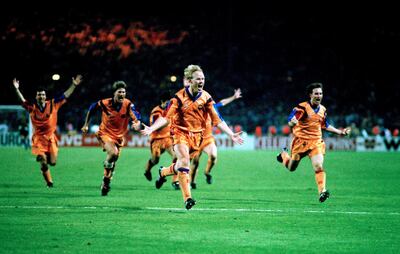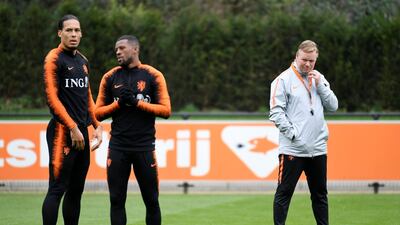A pair of freshly minted gold medals have been dangling around at the Netherlands’ base camp over the past couple of days. Greatly welcome they are, too.
Behind the back-slapping that greeted Liverpool champions Gini Wijnaldum and Virgil van Dijk when they joined up with their national team is an acknowledgement that Dutch football has been deprived of major medals for too long.
Wijnaldum and Van Dijk, both in the Liverpool starting XI for last Saturday's 2-0 win over Tottenham Hotspur in the Uefa Champions League final, are the first Dutch winners of club football's top club prize since Arjen Robben scored the winning goal in the final for Bayern Munich six years ago.
That seems a long gap for a country that has been exporting talent in abundance to the continent’s super clubs for almost as long as the European Cup has existed.
For the Netherlands, who meet England in Guimaraes on Thursday evening for a place in the inaugural Uefa Nations League final, the Van Dijk and Wijnaldum medals are confirmation of a broader revival.
As manager Ronald Koeman points out: “We could easily have had six or seven Dutch players in the Champions League final.”
His point is that, but for an extraordinary injury-time Spurs comeback in the semi, Liverpool would have been playing Ajax in the final, the most decorated Dutch club having enjoyed their most successful season in the Champions League for more than a decade.
Four of Ajax’s high achievers are in line to play a part this evening in what Koeman sees as a key step in the revival of Dutch football. “We are all proud to put Holland back in the big tournaments,” he says.
Koeman most of all. When he took over as manager of the national team 16 months ago, the senior national team looked in a state of alarming disrepair, and on a steep descent.
Either side of Robben’s match-winning performance for Bayern in the European Cup final, the Netherlands of Robben, of Wesley Sneijder, of Robin van Persie had collected a silver and a bronze medal at successive World Cups, in 2010 and 2014.
With that as the backdrop, the Netherlands' failure to even make the play-offs for the most inclusive European Championships in history, the 24-team 2016 edition, seemed freakish.
But once they tripped up again on the road to the 2018 World Cup, finishing third in their qualifying group, the diagnosis was grave. Three different managers had been tried, two major tournaments missed.
Koeman, dismissed by Everton in October 2017, became available at the right time for the Dutch federation. They were not put off by his disappointing spell on Merseyside, but reassured that, as a club manager with Ajax, with Feyenoord and with Southampton, the 56-year-old has been successful more times than not.
And Koeman has cachet in the Netherlands from his playing career, twice a European Cup winner - with PSV Eindhoven and with Barcelona - and a key member, as a forward-thinking central defender, of the Netherlands who won the 1988 European Championships.
As the Netherlands manager, Koeman has been pragmatic in some respects, radical in others.

On taking up the role, he indicated, respectfully and logically, to the veterans in their mid-30s - Van Persie, Sneijder and Robben - their time was ending, and did so in the belief a special generation might be about to emerge, its flag-bearers the likes of midfeilder Frenkie de Jong, who joins Barcelona from Ajax this month, and Matthijs de Ligt, the 19-year-old Ajax captain.
He also knew he had leaders: Van Dijk had been Koeman’s trusted ally at Southampton, from where the defender moved to Liverpool as the game’s most expensive defender - a tag the precocious De Ligt may soon inherit.
The Nations League, a new competition for a new-look Netherlands, proved a blessing: Germany and France were both thrillingly beaten in the mini-league the Dutch topped to reach the final tournament.
Koeman wants to harness that momentum, and the positive rollover from Ajax and Liverpool’s seasons. So on Tuesday, he consulted Van Dijk and Wijnaldum about their readiness, after two days of celebrations, to play against England. He heard, he says, a positive response from both.
He was not surprised. Koeman has been in their position himself.
He collected his first European Cup gold medal as a player shortly before helping the Netherlands win at Euro 1988. He scored the winning goal in the 1992 European Cup final, for Barcelona, days before lining up for the Netherlands at the next European Championships, when the Dutch reached the semi-finals.
In Koeman’s experience, there is no better antidote to tiredness than winning finals.


